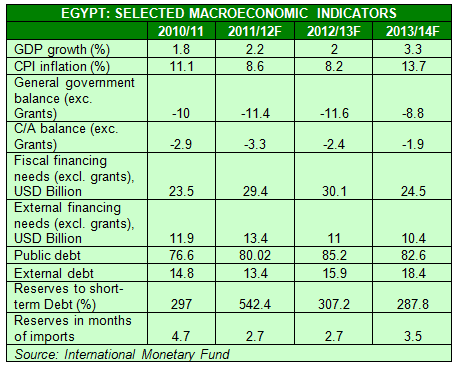The Egyptian market soared more than 7% as news of the Muslim Brotherhood government's ouster was announced and investors hoped it would lead to greater market-focused economic decision-making.
However, Fitch Ratings immediately downgraded Egypt's sovereign rating to B-, citing political uncertainty.
"Heightened uncertainty and inflamed political tensions are likely to set back the recovery and may worsen already seriously deteriorated fiscal outcomes," said Paul Gamble, director of Fitch Ratings.
Meanwhile, Pharos Research notes that some stocks could offer as much as a 100% upside potential.
"Unlike the risk compression-based rally that followed the election of the ousted president in June 2012, the current rally will likely be driven by both significant compression in the required cost of capital and upward revision in earnings," said Cairo-based Pharos investment bank.
"At a risk-free rate of around 8.0% (versus 12.0% at present), most actively traded stocks would offer upside potentials above the 100.0% mark."
Much of the rally will be predicated on the decisions of an interim technocratic government.
"We expect the valuation re-rating cycle to be aggressive in July and will trigger a steep equity market rally. Domestic cyclical plays are our top picks, particularly banks, real estate, non-bank financials and building materials," said Pharos.

USD10BN SUPPORT NEEDED
Support from Gulf states, especially UAE and Saudi Arabia will also help, although Qatar may keep a low profile after enthusiastically backing the much-maligned Muslim Brotherhood government.
"IMF deal and subsidy reform now highly unlikely, big question marks over USD8 billion of existing Qatari cash being rolled over in a couple of years, USD 19 billion of pledged FDI in next four years (more than everyone else put together over the last five)," said Emad Mostaque, strategist at Noah Capital Markets.
It could be a tricky few months, given import cover under three months, a bad few months for trade balance through Ramadan, diesel and fuel stocks running out and a likely wait-and-see approach from foreign investors, said Mostaque.
"Egypt now probably needs USD 10 billion over the next half year or so and this may be a struggle, with 12 million NDFs currently pricing in 30% devaluation and CDS spreads above 1,000bps with 2020s trading above 10% (dollar bonds)."
The new interim government will have to contend with a number of urgent economic issues.
The most immediate challenges are to put policies in place to contain the large fiscal and balance of payments deficits, support rapid economic recovery and job creation, and protect the most vulnerable segments of the population, said the International Monetary Fund (IMF).
"On the fiscal front, bringing the budget balance back on a sustainable path requires better control of public expenditures, including by rationalizing the costly and ill-targeted energy subsidies (which exceeded 6% of GDP in FY 2011/12), and increasing tax revenues with fairness," said the IMF in an April report.
A further period of political volatility will do little to resolve the key issues, said Jon Mark, associate fellow at Chatham House.
"How to give Egyptians a greater voice in running their economy and how to generate the significantly increased national income needed to meet the estimated 83 million population's aspirations."
STOCK PICKING
Apart from Pharos that expects a 100% upside for some stocks, other analysts are also bullish.
Cairo-based Naeem Holding believes Centamin (upside potential 78.4%), Alex Pharma, Cairo Pharma and Nile Pharma are some of the mid and small caps that could get a boost.
Other major stocks such as Commercial International Bank (upside potential 21.6%), Telecom Egypt (43.3%), Orascom Telecom Holding (22.2%) and Suez Cement (28%) are some of the other stocks that could deliver results.
Sidi Kerir Petrochemicals (32.8%) and Egyptian Kuwaiti Holding Co. (60%) are also expected to do well, according to Naeem Holding research.
However, political uncertainty and greater dissent from pro-Muslim Brotherhood supporters could upset any burgeoning rally.
"My key concern is that it may well get even harder to repatriate EGP to other currencies than it is now (hit and miss) and there simply isn't the firepower to defend the currency, particularly as Egypt's gold reserves have taken a pounding," said Mostaque.
"If EGP continues being tough to repatriate then the MSCI could well kick Egypt out of its indices. Any aid that does come in has higher priority locations such as the huge energy bill etc."
MACROECONOMIC WOES
Egypt is desperately in need of structural reforms but it is unlikely to be accomplished by the interim government, which will have a limited mandate.
That means the country's economic challenges will continue to hinder investor confidence and keep the private sector and foreign investors biding their time before there is more clarity.
"Creating a more transparent and competitive business environment, addressing in orderly and transparent manner business litigations (past privatizations and tax arrears), streamlining burdensome regulations, and improving access to financing, especially for small enterprises, would help boost economic activity and create jobs," said the IMF.
And that was the Muslim Brotherhood's biggest mistake: instead of focusing on economic reforms, it trained it sights on ideological issues. The new elected government - whenever it comes to power - will do well to focus on the economy first and foremost to keep Egyptians off Tahrir Square and on to job-creating endeavors.
© alifarabia.com 2013




















